Fascinating Pet Insurance Statistics 2019-2020: Breeds, Pre-Existing Conditions, And More
From July 2019 through May 2020, Pawlicy Advisor generated personalized pet insurance education for tens of thousands of dogs and cats. Each recommendation is personalized to the pet based on the pet’s unique attributes, and only after analyzing hundreds of policies across top pet insurance provider companies.
Below are some of the most important insights we uncovered in our data analysis, including the methodology for Pawlicy Advisor's report on pet insurance statistics.
2020 Pet Insurance Statistics:
- Pet Emergency Preparedness
- Pet Type and Gender
- Most Popular Breeds of Parents Interested in Pet Insurance
- Most Common Breeds with Health Conditions before Pet Insurance Enrollment
- Most Popular Pet Names
- Unique Pet Names
- Research Methodology
- What is Pawlicy Advisor?
- The Key Pet Insurance Statistics in Review
Pet Emergency Preparedness
The rising cost of veterinary care is one of the key reasons pet parents search for pet insurance in the first place.
Although a regular checkup isn’t usually that expensive, there’s always the possibility that the veterinarian will find something wrong with the pet. The pet could then require additional diagnostics and potential treatment, leading to unexpected costs.
How 20,000+ Pet Parents Would Handle a $5K Vet Bill without Pet Insurance
When a pet parent compares top pet insurance companies on Pawlicy Advisor they are first asked, “How would you handle a vet bill of $5,000?”
This high unexpected cost represents a common worst-case scenario in which the pet needs lifesaving care or expensive diagnostics and treatment. According to Joshua Louis Lachowicz, a veterinary oncologist at BluePearl Veterinary Partners in New York City, treatments for some illnesses could cost between $4,000 to $14,000.
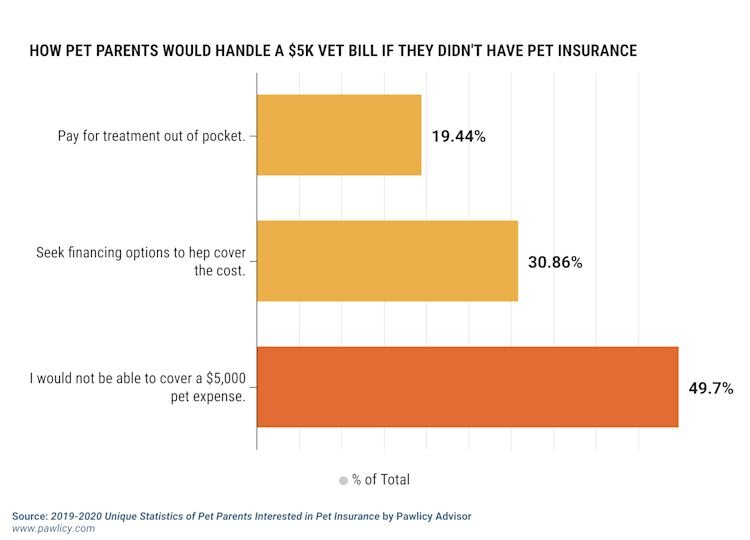
- Only 19.44% of pet parents surveyed would be able to cover a $5,000 expense out-of-pocket.
- 30.86% would seek financing options such as a loan, a credit card, or a payment plan offered by the veterinarian.
- 49.7% of this dataset of pet parents surveyed say they would not be able to cover a $5,000 expense out-of-pocket.
49.7% of pet parents surveyed who are interested in pet insurance say they would not be able to cover a $5,000 expense out-of-pocket.
This is a critical factor in what makes pet insurance worth the cost for both pet parents and veterinarians. Furthermore, with the recent onset of COVID-19 across the US, this statistic is likely to grow as households struggle with financial insecurity.
Millennials may be especially vulnerable to financial insecurities caused by the coronavirus pandemic, as median earnings are 20% lower for those aged 18 to 34 than they were in the 1980s. That wage gap, paired with many Millennials’ shift in viewing their pets as family, should highlight the importance of insurance for Millennial pet parents.
With veterinary costs on the rise, pet lifespans increasing, and the US economy shaken by the COVID-19 pandemic - pet parents must be educated about pet insurance options and the overall costs associated with owning a pet.
Pet Type and Gender
Pet type (species) and gender also factor into pet insurance rates, and they’re an important input in Pawlicy Advisor’s pet insurance recommendation algorithm.
From the tens of thousands of pet parents we surveyed, we analyzed pet insurance options from top providers for an even greater number of pets (as many parents are looking to insure multiple pets.
Dogs account for 81.62% of pets whose parents are interested in pet insurance.
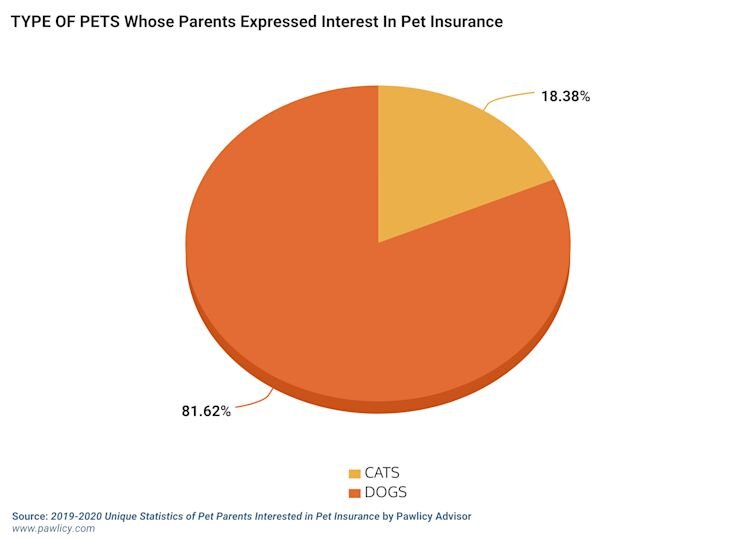
- Dogs account for 81.62% of pets whose parents are interested in pet insurance.
- Cats account for 18.38% of the pets we analyzed insurance options for.
Not surprisingly, most pet parents who shopped for pet health insurance on Pawlicy Advisor in the last 9 months were looking for insurance for their dog. Dogs tend to be more expensive to treat than cats due to their size, but also because of the history of dog breeding.
Some dog breeds are more prone to illnesses and injuries than others. For example, large and giant dog breeds are more susceptible to bloat and hip dysplasia. Dog breeds with short snouts are more prone to breathing problems.
Cats, meanwhile, don’t suffer from as many breed-specific illnesses because their breeding history has allowed for more genetic diversity. According to the ASPCA, cat veterinary costs are lower than those of dogs on average. Some studies even indicate that cats get sick less often than dogs.
As a result, it usually costs less to buy insurance for a cat than it does for a dog. This is another important input in the Pawlicy Advisor algorithm for finding affordable pet insurance policies that suit the pet’s attributes.
Pet gender is a near-even split, 47.4% female and 52.6% male.
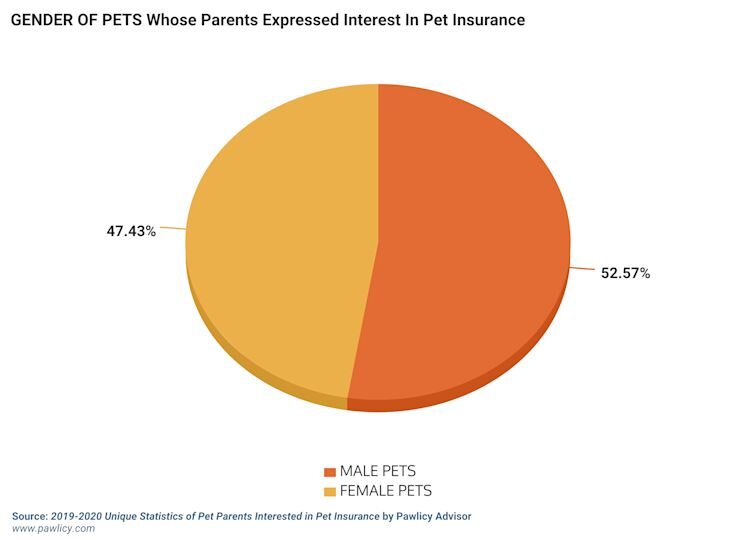
- A slight majority, 52.57%, are male, while 47.43% are female.
Pet gender does affect spaying and neutering costs. Spaying a female pet requires a more complicated surgery, so it generally costs a bit more. Unspayed and un-neutered pets have an increased risk for additional medical complications later in life, such as infections and cancer, which could be costly to treat. Furthermore, breeders who wish to insure their animals may need to buy specific insurance plans that cover breeding risks.
Dog and Cat Breeds
Pawlicy Advisor users submitted queries for over 225 different dog breeds over the past year.
Certain breeds are prone to specific health conditions, and certain variations of mixed-breeds reveal different premiums. This info is often tucked away in the fine print of any given policy. Pawlicy Advisor was built to scan hundreds of policy variations to help determine which insurance plan (and provider) is best for each unique pet.
The Most Popular Dog Breeds of Parents Interested in Pet Insurance
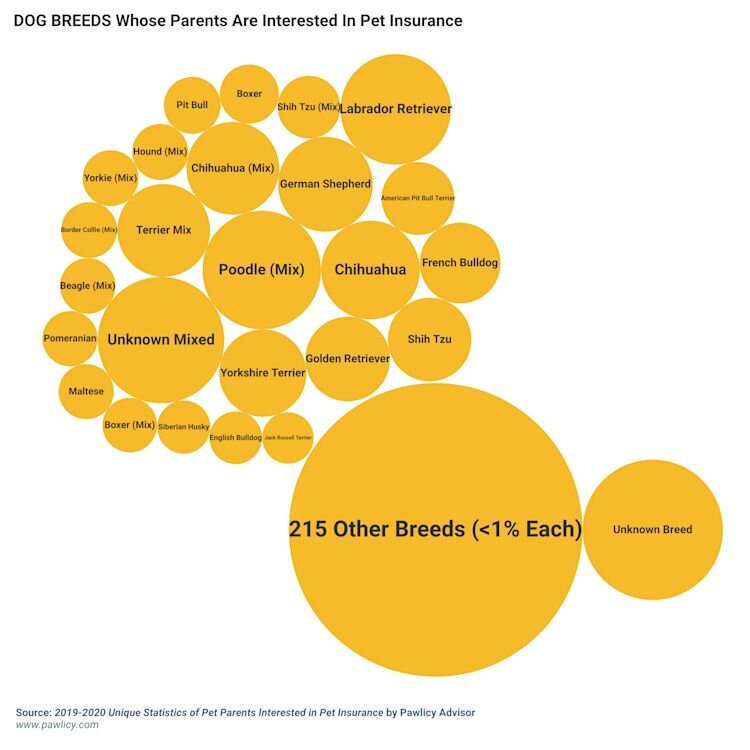
- 7.95% of the dogs were of an unknown breed, and 6.20% were of an unknown mix of breeds.
- However, Poodles (5.45%) and Labrador Retrievers (4.74%) were also popular.
- Meanwhile, 3.78% of users had Chihuahuas (and another 3.34% had a Chihuahua mix).
- 3.49% had a German Shepherd.
- 3.34% had a Terrier Mix.
- And 34.8% was made up of 215 other breeds, each with less than 1% each
Other popular breeds were French Bulldogs, Shih Tzus, Golden Retrievers, Yorkshire Terriers, and American Pit Bull Terriers. According to the American Kennel Club Registry List, the Labrador Retriever has been the most popular dog breed in the U.S. for the past 29 years.
What’s interesting is that so many pet parents with Chihuahuas are interested in pet insurance. Poodles make up a large segment, and this is to be expected as it’s a breed with common health issues and the 6th most popular dog among US households. Similar story with Labrador Retrievers. Chihuahuas are a generally more affordable breed to adopt, but perhaps the driving factor is that the tiny breed often struggles with luxating patellas (slipped kneecaps), dental issues, and hypoglycemia (burning more energy than they consume).
Top 50 Dog Breeds Whose Parents Are Interested in Pet Insurance
eed | Rank |
|---|---|
Poodle Mix | 1 |
Chihuahua | 2 |
German Shepherd | 3 |
Chihuahua Mix | 4 |
Terrier Mix | 5 |
Mixed (Breed Unknown) | 6 |
Yorkshire Terrier | 7 |
Golden Retriever | 8 |
Shih Tzu | 9 |
French Bulldog | 10 |
American Pit Bull Terrier | 11 |
Labrador Retriever - Black | 12 |
Shih Tzu Mix | 13 |
Boxer | 14 |
Labrador Retriever - Yellow | 15 |
Pit Bull | 16 |
Hound Mix | 17 |
Yorkie Mix | 18 |
Border Collie Mix | 19 |
Beagle Mix | 20 |
Pomeranian | 21 |
Maltese | 22 |
Boxer Mix | 23 |
Siberian Husky | 24 |
English Bulldog | 25 |
Jack Russell Terrier | 26 |
Australian Shepherd | 27 |
Labrador Retriever | 28 |
Rottweiler | 29 |
Labrador Retriever - Chocolate | 30 |
Dachshund Mix | 31 |
Pug | 32 |
Bichon Mix | 33 |
Miniature Schnauzer | 34 |
Beagle | 35 |
Great Dane | 36 |
Cavalier King Charles Spaniel | 37 |
Boston Terrier | 38 |
American Bulldog | 39 |
American Staffordshire Terrier | 40 |
Pomeranian Mix | 41 |
Dachshund miniature - smooth coat | 42 |
Poodle - Toy | 43 |
Poodle - Standard | 44 |
Bichon Frise | 45 |
Border Collie | 46 |
Australian Shepherd - miniature | 47 |
Havanese | 48 |
Doberman Pinscher | 49 |
Dachshund | 50 |
The Most Popular Cat Breeds of Parents Interested in Pet Insurance
Pawlicy Advisor users were less specific in how they designated their cat breeds, although the breed is often less of a consideration when insuring domestic cats. Most cats are considered Shorthair, Mediumhair, or Longhair.
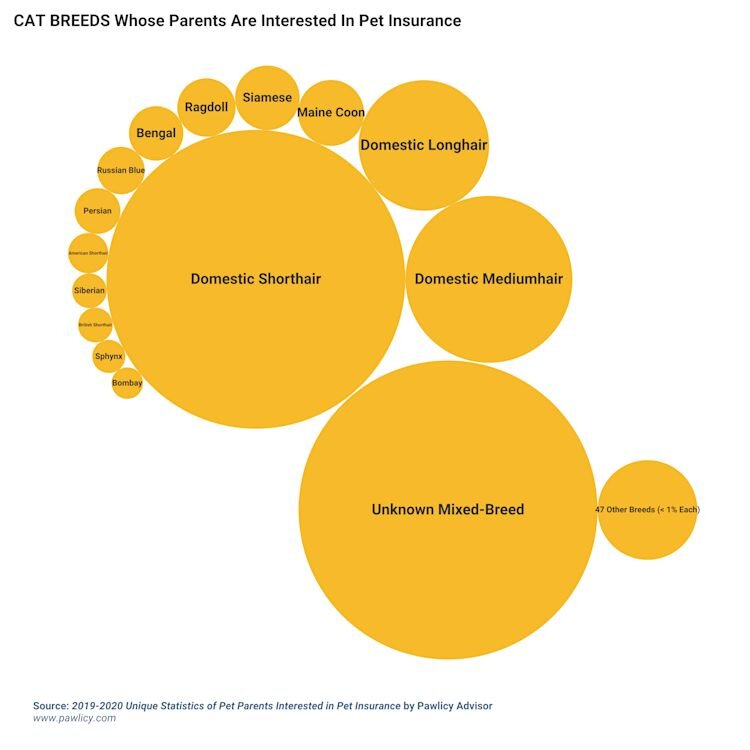
- 33.89% of the cats we analyzed for pet insurance quotes were identified as Domestic Shorthair.
- 10.58% were Domestic Mediumhair.
- 6.47% were Domestic Longhair.
- And 35.42% were an Unknown Mixed-Breed.
According to our data, a plurality of pet parents interested in pet insurance had Domestic Shorthair cats, at 33.89%. Meanwhile, 10.58% had Domestic Mediumhair cats and 6.47% had Domestic Longhair cats. Among specific cat breeds, Maine Coons, Siamese, Ragdolls, and Bengals are among the most popular.
NOTE: Domestic Shorthair, Mediumhair, and Longhair are all technically generalized categories of “mutts” (mixed-breed cats).
Top 50 Cat Breeds Whose Parents Are Interested In Pet Insurance
Breed | Rank |
|---|---|
Unknown Mixed-Breed | 1 |
Domestic Shorthair | 2 |
Domestic Mediumhair | 3 |
Domestic Longhair | 4 |
Maine Coon | 5 |
Siamese | 6 |
Ragdoll | 7 |
Bengal | 8 |
Russian Blue | 9 |
Persian | 10 |
American Shorthair (purebred) | 11 |
Siberian | 12 |
British Shorthair | 13 |
Sphynx | 14 |
Bombay | 15 |
Snowshoe | 16 |
Himalayan | 17 |
Tonkinese | 18 |
Egyptian Mau | 19 |
Scotish Fold | 20 |
Himalayan Seal Point | 21 |
Turkish Van | 22 |
Balinese | 23 |
RagaMuffin | 24 |
Norwegian Forest Cat | 25 |
Cornish Rex | 26 |
Burmese | 27 |
Munchkin | 28 |
Manx | 29 |
Feral | 30 |
Abyssinian | 31 |
Oriental Shorthair | 32 |
Exotic Shorthair | 33 |
American Wirehair | 34 |
American Bobtail | 35 |
Turkish Angora | 36 |
Himalayan Flame Point | 37 |
Himalayan Blue Point | 38 |
Chartreux | 39 |
Somali | 40 |
Scottish Fold Longhair | 41 |
Savannah | 42 |
Ocicat | 43 |
Nebelung | 44 |
Manx Longhair | 45 |
Havana Brown | 46 |
Exotic | 47 |
European Shorthair | 48 |
Cameo Longhair | 49 |
Birman | 50 |
Pre-Existing Conditions
There are no pet insurance providers that cover pre-existing conditions (though some plans do cover curable conditions after a certain waiting period with no recurring symptoms), which is why it's so important to enroll in pet insurance while your pet is still young and healthy. If you enroll before any conditions arise, those conditions will be covered by your plan. Wait too long, and you’ll have to pay out-of-pocket to treat your pet.
Percent of Dogs with Pre-Existing Conditions Whose Parents Are Interested in Pet Insurance
A clear majority of dog parents understand the importance of signing up for insurance early, before their pup is diagnosed with any health conditions. But thousands of pet parents are looking for pet insurance for a pet with a pre-existing condition.
9.8% of dog owners are shopping for pet insurance for a dog with a pre-existing condition.
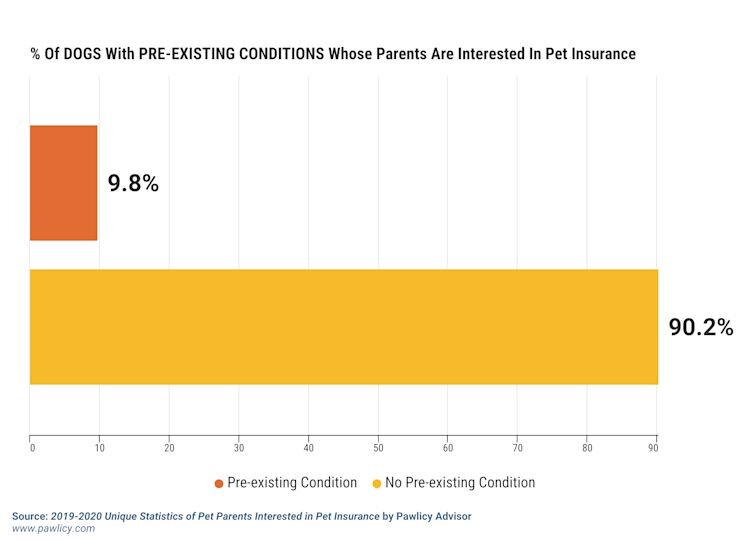
- After surveying tens of thousands of dog owners, 9.8% of the dogs who needed insurance already had an existing condition.
- 90.2% of the dogs we generated a pet insurance comparison did so before their dog developed a condition that could be considered “pre-existing.”
The importance of comparing pet insurance sooner rather than later becomes even more evident when looking at the age breakdown of those with pre-existing conditions below.
Puppies vs Adult Dogs with Pre-Existing Conditions Whose Parents Are Interested in Pet Insurance
Puppies are far less likely to develop health conditions than their older counterparts. It’s best not to wait until a condition arises. Most pet insurance plans include a waiting period, and if your vet discovers an illness before your insurance kicks in, it is usually considered “pre-existing” by the insurance company.
87.97% of the dogs that did have pre-existing conditions were adults.
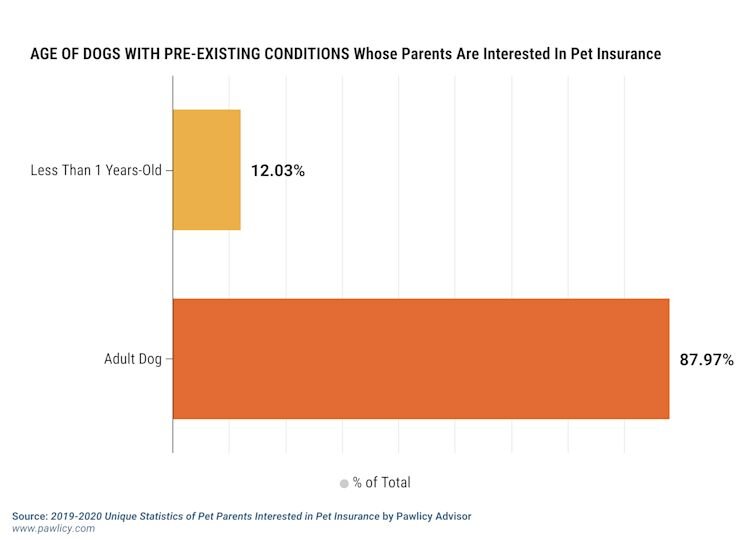
- 87.97% of the dogs that did have pre-existing conditions were adults.
- Only 12.03% were puppies less than one year old.
That data should encourage new puppy parents to look into pet insurance, ASAP. Out-of-pocket costs can be greatly reduced for both vet bills and pet insurance premiums by finding the right coverage sooner rather than later (and the same is true for insuring rescue puppies).
Percent of Cats with Pre-Existing Conditions Whose Parents Are Interested in Pet Insurance
Similarly, while most of the cat parents that searched for insurance did so before their pets developed any pre-existing conditions - more than 1 in 10 were shopping for a cat with a pre-existing health condition.
12.27% of cat owners are shopping for pet insurance for a cat with a pre-existing condition.
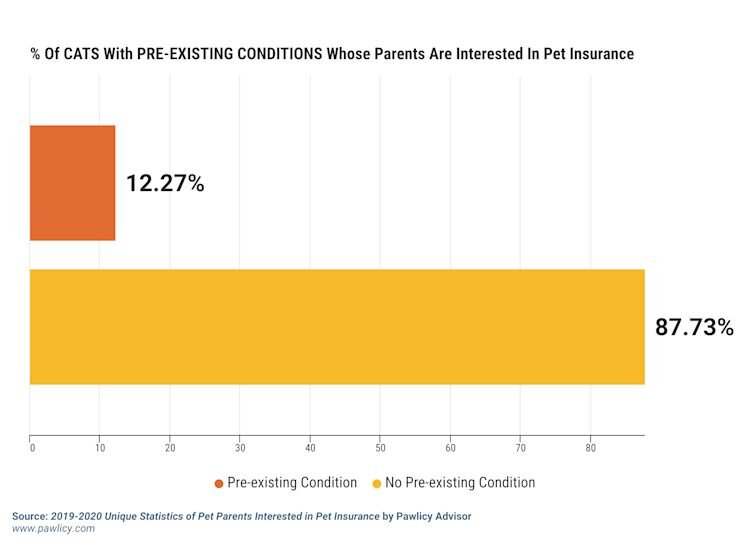
- 12.27% of the cats we analyzed had a pre-existing condition.
- 87.73% of cats had a clean bill of health.
Although vet care is generally less expensive for cats, treating major illnesses can still leave a serious dent in your wallet without insurance.
NOTE: If your pet has a pre-existing condition, pet insurance is still worth the investment. For one, if the condition is curable, it can be covered by some plans. You can find out which plans fit you best by generating a new search on Pawlicy Advisor. If the condition is not curable, other conditions may arise, and having to pay fully out-of-pocket for multiple medical expenses is a nightmare. If the cost of pet insurance is an issue for you, use Pawlicy Advisor’s recommendation engine to find the best plan at the best price.
91.9% of the cats that did have pre-existing conditions were adults.
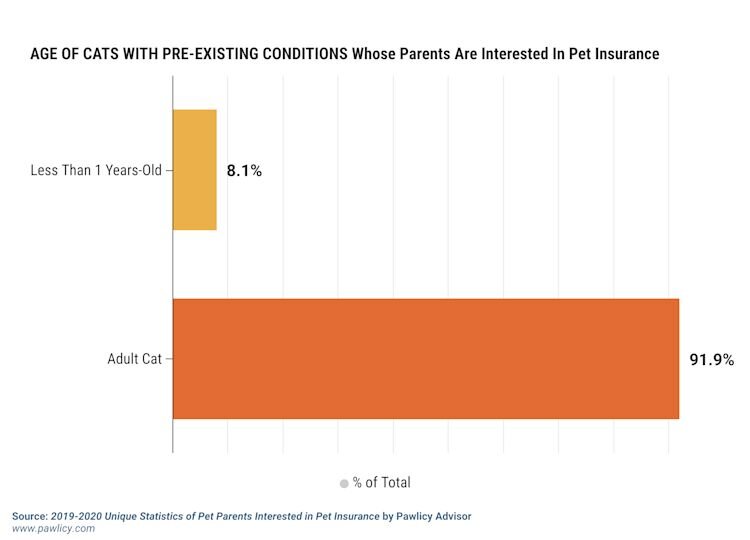
- 8.1% of the cats with pre-existing conditions were less than one year old.
- Meanwhile, 91.9% of cats with an existing condition were adults.
Just like puppies, kittens are less likely to be diagnosed with a pre-existing condition than their adult counterparts. Insuring your kitten can save you thousands of dollars in veterinary costs as they grow older.
According to one analysis, the costs of treating cancer in a cat can cost over $2,800+ without pet insurance. With pet insurance, it costs less than $600 on average.
More importantly, pet insurance also ensures that the cat gets the care they needs. The same analysis indicated that the cost of care for cancer in cats based on insurance claims can reach almost $15,000. Pet parents who must pay expenses out of pocket may not be able to afford important treatment options.
Most Common Breeds That Developed Health Conditions Before Pet Insurance Enrollment
Humans have been breeding dogs for almost 4,000 years . Due to limits in genetic diversity, some purebred dog breeds are more prone to pre-existing conditions than others. Our findings indicate the same applies to cats, as well.
The Most Common Dog Breeds with Pre-Existing Conditions Whose Parents Are Interested in Pet Insurance
Based on the analysis of our data, many pet parents with smaller dog breeds and purebred dogs reported pre-existing conditions in their pets.
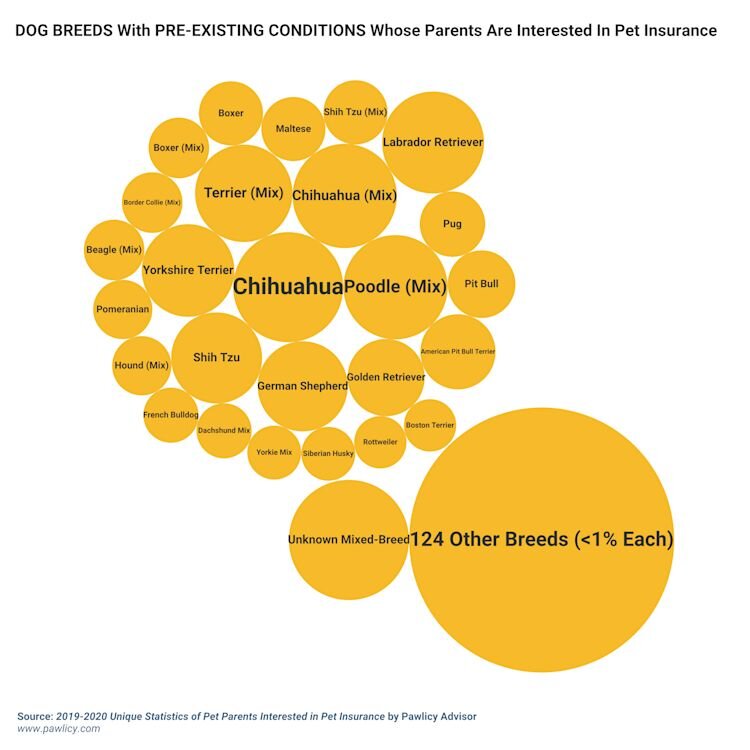
- Chihuahuas (4.4%), and Chihuahua Mixes (3.95%) represented many of the dogs with pre-existing conditions.
- As well as Terrier Mixes (3.45%), and Yorkshire Terriers (3.12%).
- Additionally, 3.95% of dogs with pre-existing conditions were Poodles
- 3.78% were Labrador Retrievers
- 3.01% were Shih Tzus.
Now, this shouldn’t deter anyone from adopting/rescuing a purebred dog. If you adopt a purebred puppy, you can enroll in pet insurance early to ensure any conditions that might emerge are covered by your policy.
Top 10 Dog Breeds That Developed Health Conditions Before Enrolling In Pet Insurance
| Breed | Rank |
|---|---|
| Unknown Breed | 1 |
| Chihuahua & Chihuahua Mix | 2 |
| Poodle Mix | 3 |
| Terrier Mix | 4 |
| Yorkshire Terrier | 5 |
| Shih Tzu | 6 |
| Mixed (Breed Unknown) | 7 |
| German Shepherd | 8 |
| Golden Retriever | 9 |
| American Pit Bull Terrier | 10 |
The Most Common Cat Breeds with Pre-Existing Conditions Whose Parents Are Interested in Pet Insurance
The most common cat breeds with pre-existing conditions mirror the results of the most popular cat breeds from the previous question.
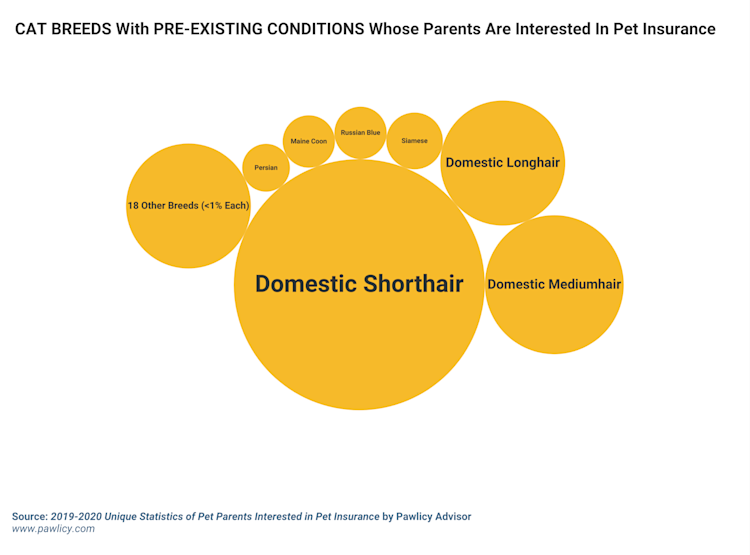
- 27.73% of cats with existing health conditions that we analyzed were Domestic Shorthairs.
- 8.50% were Domestic Mediumhair cats.
- And 6.88% of cats represented with pre-existing conditions were Domestic Longhairs.
Among the top pure-bred cats that had existing conditions were Siamese cats (1.42%), Russian Blues (1.21%), Maine Coons (1.21%), Persians (1.01%), and 18 other breeds each making up less than 1% of the total.
Top 10 Cat Breeds That Developed Health Conditions Before Enrolling In Pet Insurance
Breed | Rank |
|---|---|
Mixed Breed | 1 |
Domestic Shorthair | 2 |
Domestic Mediumhair | 3 |
Domestic Longhair | 4 |
Siamese | 5 |
Russian Blue | 6 |
Maine Coon | 7 |
Persian | 8 |
Ragdoll | 9 |
American Shorthair (purebred) | 10 |
The Most Popular Pet Names
Overall, there were a ton of great pet names that went through the Pawlicy Advisor search algorithm. Bella, Max, Luna, Lucy, Charlie, Buddy, Daisy, Molly, and Lola are just a few that stand out as the most popular. But the real gems are in the more obscure names like Cthulhu, Jiggles, Sir Pounce A Lot, and Zig Zag.
For example...
The Most Popular Dog Names
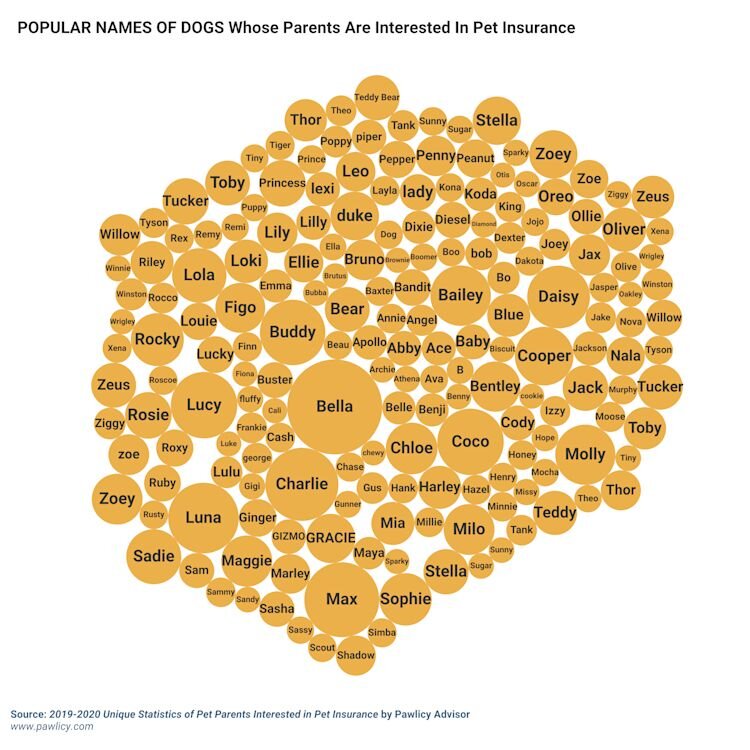
The most popular dog names were Bella, Max, Charlie, Luna, Coco, and Lucy. There were also a few Bobs and Peanuts thrown in for good measure. And who couldn’t love a dog named Bruno, Bear, or Bandit?
Top 20 Most Popular Dog Names
Breed | Rank |
|---|---|
Bella | 1 |
Max | 2 |
Charlie | 3 |
Luna | 4 |
Coco | 5 |
Lucy | 6 |
Buddy | 7 |
Daisy | 8 |
Bailey | 9 |
Molly | 10 |
Cooper | 11 |
Sadie | 12 |
Lola | 13 |
Rocky | 14 |
Sophie | 15 |
Chloe | 16 |
Maggie | 17 |
Milo | 18 |
Zoey | 19 |
Bentley | 20 |
The Most Popular Cat Names
Naturally, there’s some overlap between dog and cat names.
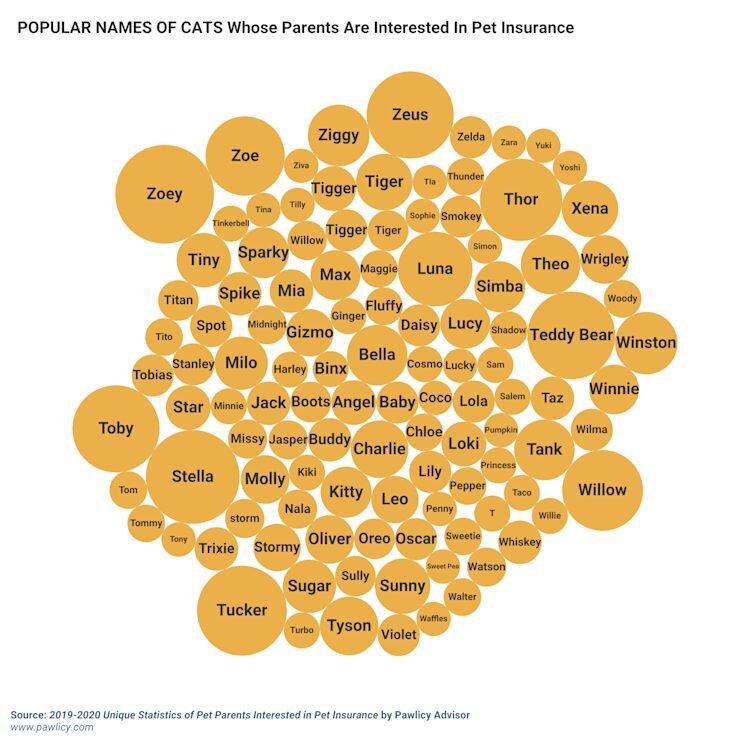
Many cat parents also named their cats Luna. Among the most popular cat names were Zoey, Stella, Tucker, Teddy Bear, Zeus, Toby, and Thor.
Top 20 Most Popular Cat Names
Breed | Rank |
|---|---|
Zoey | 1 |
Stella | 2 |
Tucker | 3 |
Teddy Bear | 4 |
Toby | 5 |
Zeus | 6 |
Thor | 7 |
Willow | 8 |
Zoe | 9 |
Luna | 10 |
Winston | 11 |
Ziggy | 12 |
Bella | 13 |
Tank | 14 |
Theo | 15 |
Tyson | 16 |
Charlie | 17 |
Tiger | 18 |
Xena | 19 |
Sunny | 20 |
105 Unique Pet Names That Caught Our Eye
We also compiled a list of the many pet names that stood out as particularly unique. If you’re looking to adopt or have recently adopted, we hope you consider a few name options like “Mr. Muffin-Stuff” and “Albus Dumbledog.”
- Albus Dumbledog
- Azreal
- Angel Panda
- Angelfish
- Basilious Haro
- Beaumont
- Beef
- Bernie
- Bertrum
- Bighead
- Binx
- Bones
- Bonkers
- Catsby
- Cher
- Chowder
- Chu-Chu
- Cthulhu
- Ginger Shoopman
- Glory
- Gmork
- Gnash
- Gnat
- Gnocchi
- Gramps
- Habanero
- Hanzo
- Hektor
- Hootie
- Igloo
- Itsy Bitsy
- Jack Mayo
- Jada Doo Powell
- Jeeves
- Jiggles
- Jillaroo
- Jilly Sue
- Kit Kat
- Lightening
- Low Ryder
- Luci(fer) Anais Garcia
- Lucy Wigglebottom
- Lyric
- Madame Monkey
- Meatball McBeath
- Minion
- Miss Sunday
- Mister Moose
- Mr. Bubba Linx
- Mr. Chips
- Mr. Muffin-Stuff
- Mr. Pickles
- Muchacha
- Neptune
- Oatmeal
- Oedipus Rex
- Ohno
- Oogie Boogie
- PantsDeLeon
- Pennywise
- Pesto
- Pinball
- Pixel
- Plop
- Poopoo
- Poughkeepsie
- Preacher
- Princess Potato
- Prometheus
- Quasar
- Quiggly
- Rhino
- Rhubarb
- Rick the stick
- Ruff Daddy
- Sabath
- Samwise Gamgee
- Schnaps
- Shrek
- Sigourney Weaver
- Sir Pounce a Lot
- Skunkers
- Slinky
- Sprocket
- Tabby Rascal Towler
- Thanos
- Thorn
- Toby The Taco
- Trump
- Typhoon
- Umbra Greyjoy
- Vader
- Wasabi
- Weston Greenwade
- Whoopie
- Wibbles
- Wilma Baggins
- Wombat
- Xochi
- Yankee
- Zephyr
- Zeus Mobley
- Zig Zag
- Zippy Jade
- Zsa Zsa
Research Methodology
The Pawlicy Advisor algorithm scans and prioritizes recommendations based on breed-specific risk factors, age, location, and the fine print in each provider’s policy. This enables us to rank insurance policies across top providers by lifetime cost and coverage value for each unique pet. You can also read our US pet ownership statistic report for broader insights into the landscape.

The recommendation algorithm also asks pet parents about how they’d handle an unexpected $5,000 veterinary bill to better understand the best “coverage versus cost” fit.
In data analysis, sampling is the practice of analyzing a subset of all data in order to uncover the meaningful information in the larger data set. To help maintain business confidentiality as a startup, this report dives into a sample of 20,000 pet parents from the unique data we’ve seen across the United States.
NOTE: In this report, “parents” refers to pet parents or pet owners. Rather than a thing to be owned, instead, we believe pets are unique, conscious individuals and family members.
What is Pawlicy Advisor?
Pawlicy Advisor is the first pet insurance marketplace actively endorsed by veterinarians, and we’re transforming the pet insurance industry.
Unlike the other marketplaces or review sites, we provide objective education and comparison tools to help pet parents find the right plan at the best price - no matter the provider.
Pet parents use Pawlicy Advisor to instantly scan hundreds of policies across top providers, easily finding their own best-fit quotes based on their pet’s unique breed attributes, location, age, and more. These personalized recommendations can save pet parents up to 83% on costs over the lifespan of their cat or dog.
The Key Pet Insurance Statistics in Review
- Only 19.44% of pet parents surveyed would be able to cover a $5,000 expense out-of-pocket.
- Dogs account for 81.62% of pets whose parents are interested in pet insurance.
- Poodles (5.45%), Labrador Retrievers (4.74%), and Chihuahuas/Chihuahua-Mixes (7.12%) were the most popular dog breeds of pet parents interested in pet insurance
- 9.8% of dog owners are shopping for pet insurance for a dog with a pre-existing condition.
- 87.97% of the dogs that did have pre-existing conditions were adults.
- 12.27% of cat owners are shopping for pet insurance for a cat with a pre-existing condition.
- 91.9% of the cats that did have pre-existing conditions were adults.
- The top 3 most popular dog names were Bella, Max, and Charlie
- The top 3 most popular cat names were Zoey, Stella, and Tucker
- 105 pet names stood out as particularly unique
Do you want to find the best pet insurance?
Let's analyze your pet's breed, age, and location to find the right coverage and the best savings. Ready?
Analyze My PetAbout Pawlicy Advisor
The pet insurance marketplace endorsed by veterinarians, at Pawlicy Advisor we make buying the best pet insurance easier. By comparing personalized coverage and pricing differences we can save you a ton of money, up to 83% in some instances!
Instantly Compare Pet Insurance Plans
Guides
Determine If Pet Insurance Is Worth It
Comparison Charts
Find Your State
Dog Insurance
Pawlicy Advisor is the #1 pet insurance marketplace in the U.S. Recommended by veterinarians. Trusted by 1M+ Americans. Our team of veterinary advisors and licensed insurance experts are dedicated to helping pet parents give their dogs and cats the best possible care.
